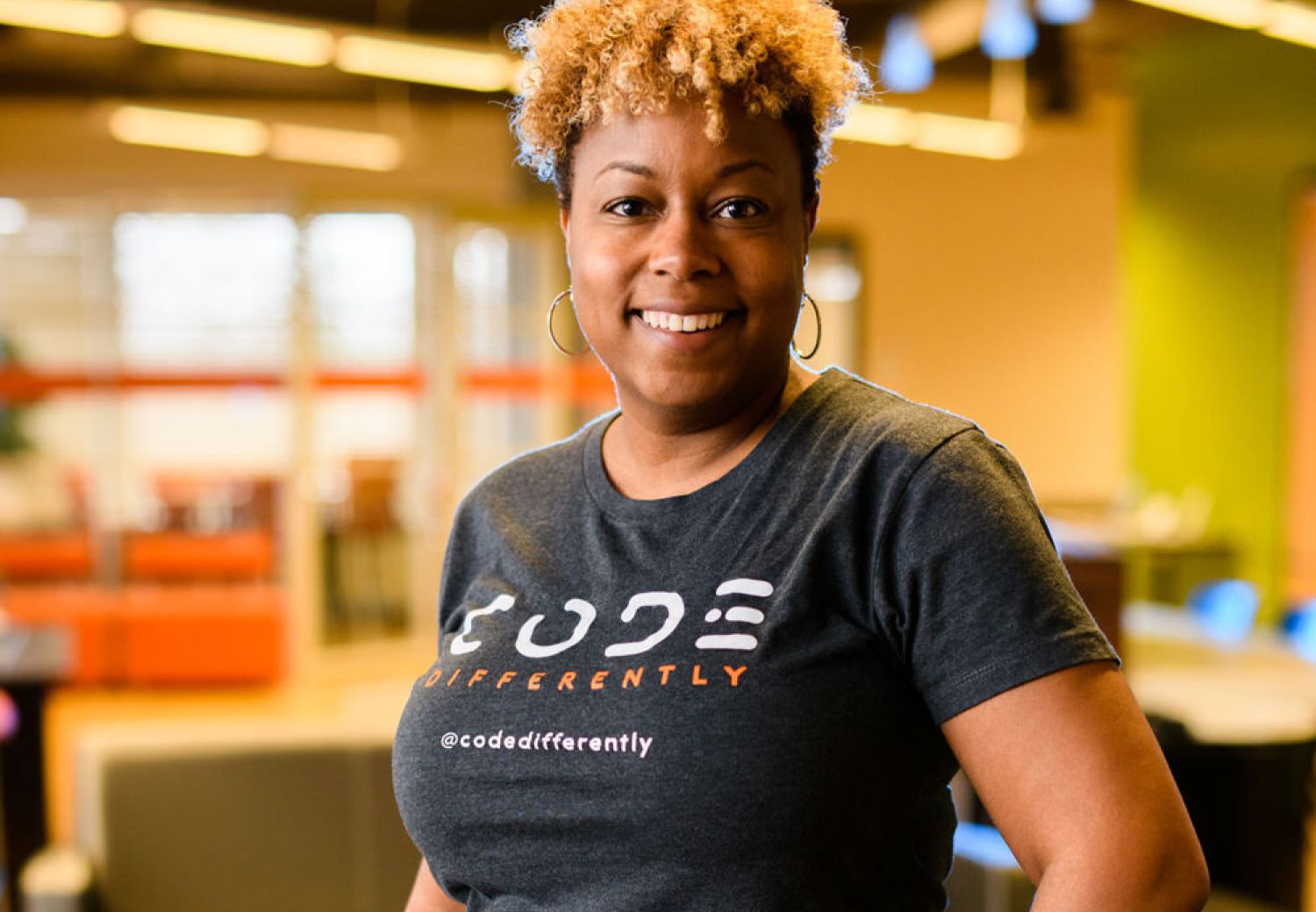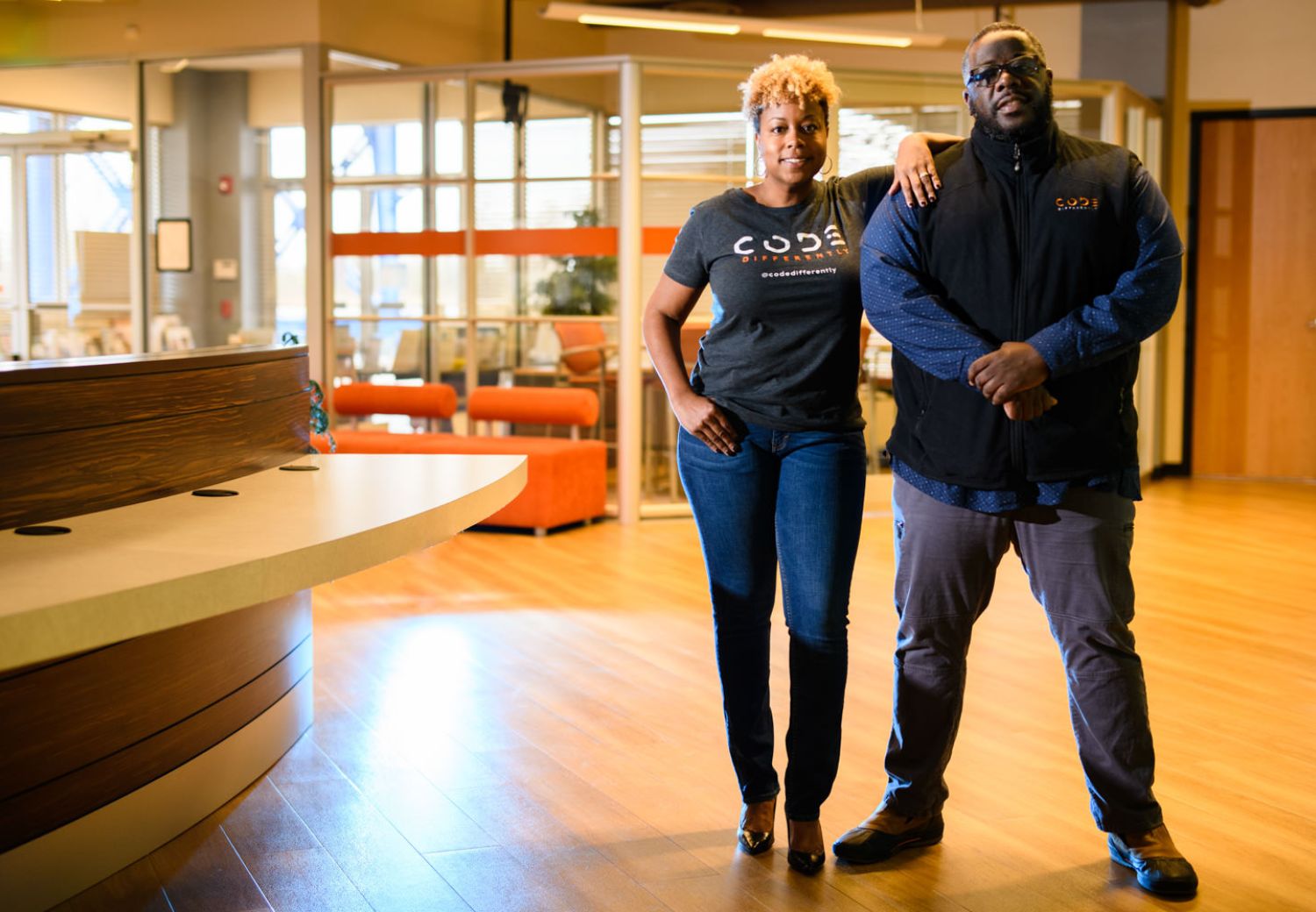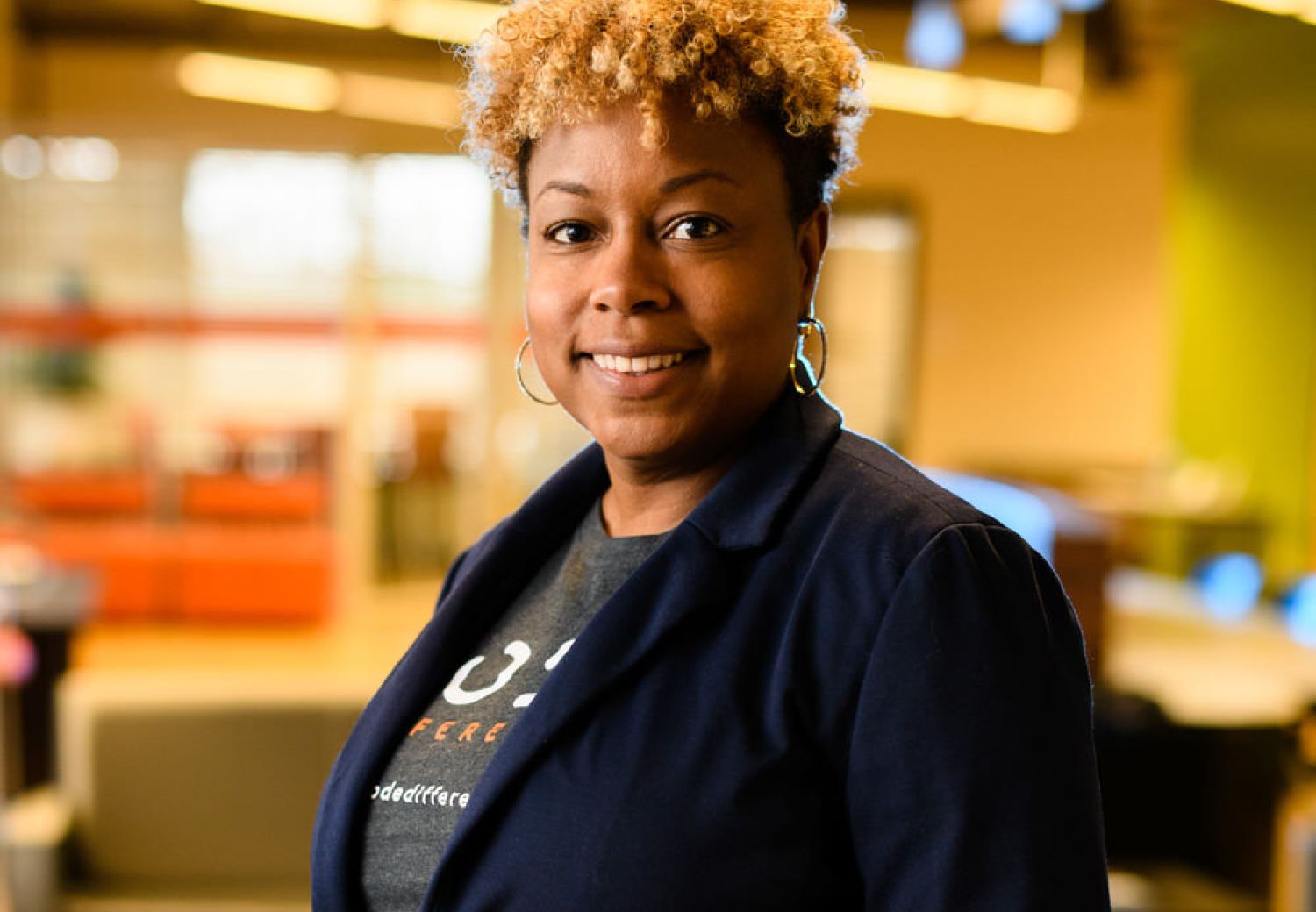CEO, Code Differently
Stephanie Eldridge loves Delaware
Stephanie Eldridge
Just two years ago, CEO Stephanie Eldridge and CIO Tariq Hook launched the learning center Code Differently, and their impact since cannot be overstated. Delaware Prosperity Partnership caught up with Eldridge remotely as she and their team are driving their business remotely with no loss in impact.
Code Differently aims to increase diversity and technology directly into the workplace. Students are primarily in college as computer science or engineering majors. The makeup of Code Differently’s classes are 98% black and latino, and within that 40% female. Women represent 25% of the technology base, but black females represent only 3% and hispanic females 1%.
“Diversity and inclusion have not only been a part of our mission from the beginning, it’s frankly been a part of our lives,” Eldridge says. Eldridge grew up in Aliquippa, a small town in Western Pennsylvania that she describes as “a tech desert.” Aliquippa is a blue-collar town that was once booming with steel mills. Once the steel mills declined, the economy declined and the educational system started breaking down. Her time in Aliquippa became the foundation that motivated her into creating a different possibility.
Eldridge attended Morgan State University, an Historically Black College and University (HBCU), who at the time were graduating the most black engineers in the nation. “Both Tariq and I worked as engineers in the industry in Delaware. I was at JP Morgan Chase at the Delaware Tech Center and Tariq was at Zip Code Wilmington.”
Eldridge arrived in Delaware based on geographic convenience. “My boyfriend at the time, now my husband, was living in Philadelphia and I was working in the Baltimore/D.C. area, and we decided Delaware was the perfect mid-point.”
Code Differently is now on the Wilmington Riverfront, in the New Castle County Chamber of Commerce building’s Emerging Enterprise Center. “The great thing about Wilmington is, if you need to catch a train, you are right there downtown. You can be in Philly, Baltimore, D.C. and New York faster than you could drive.”
In Code Differently’s 2020 cohort, there are 43 students, of which ten are from Delaware State University. “Our intention was to have all 43 students here in Delaware for the summer to see all of the great things about Wilmington and Delaware itself.” Unfortunately COVID made this impossible.
Seven of the 23 Code Differently’s students from last year ended up relocating to Delaware after recognizing the opportunities and resources here. “We are great creators of technology here in Delaware, but we’re also great importers of technology.”
Seven of the 23 Code Differently’s students from last year ended up relocating to Delaware after recognizing the opportunities and resources here. “We are great creators of technology here in Delaware, but we’re also great importers of technology.”
Eldridge is reminded constantly about the benefits Delaware has provided for their business. “I don’t know another location where you are one person, one degree of separation, away from any need. When we look outside of our windows we see the backdrop of the companies that we serve most,” Eldridge says. “When I look to the left, I see JP Morgan Chase and Capital One building that helps support our HBCU program, HBCU CSC, who also support our high school students. It is really helpful that the decision makers from these companies are actually located in Delaware.”
The most powerful piece of Code Differently is their network. “We are able to provide people who are already in HBCU industry, and that network has increased tenfold over the last year. So you have this family of corporations willing to help guide each student in ways that were not traditionally available.”
The amount of small businesses that are downtown has also been a win-win. “It gives us a vision for where people started and where they can go, the importance of supporting people in your network.”
Why ‘Differently’? Having been challenged in fitting people into boxes where they may not fit, Code Different decided to build programs that remove these barriers. 80% of the people in Code Differently programs are working 30 hours or more each week while they are in college. The consequences of that are often lower GPAs and less access to the technology needed to excel in those classes.
“Imagine you are a computer science major, COVID hits and you are at home, and now you have no access to the computer lab in your university. We try to remove those barriers. We provide a stipend so they don’t have to work, we provide them with equipment and internet access, and we focus on their professional development,” Eldridge says. The majority of students at Code Differently are first-generation college students. Most of them “come from families that don’t have the life experience for coaching on how to operate in corporate America.”
Code Differently looks are themselves holistically within the tech field. “We don’t want to be all things to all people. If there are programs already out there that we could partner with, we do.”
For example, Code Differently partnered with the New Castle County Summer Youth Program. They came up with the idea that, instead of just having the students work in the brick and mortar location, they could create a software development shop that could teach high school students how to create websites and mobile apps as a work-based learning experience.
“There are very few internships and apprenticeship opportunities for high school students in tech. So right now we have 40 students working with us, virtually now, from 12-5 p.m. every day. And we are able to work with our partner companies — the JP Morgan Chases, Barclaycards, and CSCs we have in our network provide real projects for our kids so they are getting real work experience. And by bringing in real engineers and developers to talk to the students, real relationships and experiences are occurring organically at the high school level.”
In addition to corporate partnerships, the Department of Labor, New Castle County school districts and Rodel Foundation are contributors to this effort. “It’s a great example of a private/public partnership that benefits the future career choices and development of teens.”
The results speak for themselves, and Code Differently has begun shifting the statistics that go back to the beginning of technology. “Out of the last group of high school students that have since graduated, every one of them are going on to high learning and 80% going into computer science or IT. And this becomes a pipeline for colleges that we partner with, like Delaware State University, who are now providing us with mentors in our program.”
When asked what single change she would like to see in the Delaware School system, Eldridge does not hesitate. “Embed technology in any subject that is taught in a school district. If you want to be an investment banker, you need to know how to write scripts to analyze data; if you want to open a restaurant, having an understanding of what goes into your ordering app or reservation system especially in situations like the one we are in, is essential.”
“Technology should be embedded into everyday life. It is an accessory to everything we do. If COVID has taught us anything, it is that the way we continue to run society is through technology.”
Eldridge believes the biggest misconception about technology is that it is too hard. Anything with great reward takes some work. A lot of people feel defeated when they hear the word coding, so sometimes we don’t use it. “Come help us build a game using technology.”
“In the black community, the biggest misconception is ‘I can’t do it’ which has its reasons. There are not enough people in the industry that look like Tariq and me, to give them the confidence that they could possibly do it.”
Using Delaware, its location, resources and community as a springboard, Code Differently is changing the face of technology with velocity and passion. The mantra she likes to share about Delaware is, ‘We get things done here.’”


